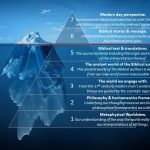Science
THE SCOPE OF SCIENTIFIC
TRUTH
Published on October 1, 2020
by Willie Mc Loud
It often happens that scientists or philosophers assert that the metaphysical universe of our speculations is in fact the scientific universe that we study in science. But is this a viable opinion?
“The heavens declare the glory of God;
And the firmament shows His handiwork.
Day unto day utters speech,
And night unto night reveals knowledge.
There is no speech nor language
Where their voice is not heard.
Their line has gone out through all the earth,
And their words to the end of the world.” – Ps. 19:1-4
In our day and age, science forms an integral part of our human existence. All the technology that we use every day is a product of scientific advancement. We can in fact, do or accomplish very little without science. Our entire lifestyle has become infused with science. Although many people harbour some idyllic desire to live in unison and harmony with nature, the reality is that very few would actually be able to do so without being totally disconnected from society.
The relationship between science and faith is not always an easy one to define. Central to this equation is our understanding of “scientific truth”. In exploring this concept, we are not only concerned with science and scientific truth but also with the scope of scientific truth. What are the boundaries and limits of scientific truth and how does it relate to metaphysical truth and Biblical truth? In our endeavour to fathom Truth it is very important that we understand how all these “truths” are related and how all the levels and layers of truth come together.
Scientific Truth
The first and foremost question to answer is: What is science? Here we can learn a lot from the philosopher, Immanuel Kant, who developed the basic philosophical groundwork for all mathematical science in his famous treatise, Critique of Pure Reason. What Kant understood, is that all science begins with human experience. In fact, science is simply the systematisation of experience for the purposes of studying things. Once experience is systematised, we can further extend the reach of our senses through the use of instruments, conducting very precise experiments in our study of the physical and natural world.
This means that science is not really something new. The use of this kind of systematisation goes back to the earliest formulations and understanding of mathematics and its application to human life. All the early astronomers and innovators, who built beautiful structures like Stonehenge, used and applied some level of science. It is, however, also true that the full realisation of the enormous potential and possibilities of the scientific endeavour is a more recent and modern development, going back to only as recently as the sixteenth century AD. Since that time, this discipline and its goal of a better understanding of our world has evolved in ways unimaginable and far beyond the wildest dreams of the ancients.
But we still need to answer the question: What is scientific truth? An important part of the systematisation of the study of things is the principle of “repeatability”. From experience we know things because we have repeatedly found the same results for many a circumstance or happening through our interaction with the world. In science, through the use of the scientific method, the same experiments can also be performed repeatedly many times over so as to test whether the same results can be obtained every time. Once we have done this kind of systematisation, it is simple to recognise “facts” without having to repeat these procedures.
But then the most difficult part of science awaits, namely the interpretation of the so-called “facts”. What do the facts actually mean? A significant feature of science and the philosophy of science is its concern with the explanation of things and events. This is where scientific models describing reality enters into our discussion. Scientists use their models to understand and interpret the data. When the facts correlate with scientific theory we arrive at scientific truth. Scientists believe that such models give a true or at least viable description of our world.
Although the basic equations of general relativity and quantum physics have been spectacularly confirmed again and again, the various applicative and interpretive models vary greatly in their explanations of what “really” happened, for example, with the Big Bang and how the quantum world “really” is. Sometimes it so happens that more than one model fit the same facts. This problem usually occurs when things that scientists are studying are not empirically accessible, when things like the “Big Bang” or quantum entities in their pre-measurement stage are beyond empirical reach. This is the reason why various theoretical models describing or interpreting the Big Bang or quantum physics exist.
Although some of these models and their accompanying interpretations may be widely accepted in the scientific community, scientists usually have a pragmatic attitude in not being all too dogmatic about such issues. Even though most scientists may believe that one or the other of these models, like the Big Bang model, is “true”, this obviously goes beyond the limits of simple scientific truth where all aspects of the objects or events studied are empirically accessible. We find a similar problem in forensic science where limited facts allow for various possible interpretations and narratives of the truth.
Scientists may have good reason to think that such models are true representations of reality but it is always possible that a more refined model and new evidence, could lead to a more sophisticated or even dramatically new understanding of things, just like Einstein’s general theory of relativity replaced Newton’s equations. In fact, the strikingly different ways in which Einstein’s general relativity and quantum theory describes reality is still one of the great challenges of science. Obviously, science does not have all the answers at its fingertips!
Scientific Truth and Metaphysical Truth
Although science is a tool for studying nature, scientists often engage in the larger questions of life that lies beyond the scope of science itself. Throughout history, humans had been thinking, theorising and philosophising about the true nature of reality. As humans, we only have access to reality through our senses and, by extension, through instruments which use the exact same principles.
Our physical access to the world is restricted to the material world due to the nature of our senses; this is called empirical access. “Empirical” simply means that which is experienced through the senses. Our senses and instruments do not allow us to experience and observe anything other than material things. In quantum physics, however, scientists have come across aspects of our world that are not empirically accessible! In this instance, there is a massive difference between the behaviour of entities before and during measurement. Before measurement, they are mathematically described in terms of an imaginary (i.e. in imaginary numbers), non-real “Hilbert” space (named after the mathematician David Hilbert) or space-time; after measurement they are located in proper space-time This is why the verification principle advocated years ago by the Logical Empiricism school has been found wanting: When quantum entities are in the pre-measurement phase, there is no way of verifying where they are located. They are real but are not part of the material world!
This introduces the question as to the true nature of all reality. When we theorise about this we also develop models, but these are “metaphysical” models. They go beyond the “physical” or “material” world, trying to make sense of the totality of all reality. Although we may believe that our metaphysical model of reality is “true”, it is immediately clear that we are now in the domain of belief, not science.
It often happens that non-religious scientists or philosophers assert that the metaphysical universe of our speculations is in fact the scientific universe that we study in science. They then make pronouncements like that of Wilfred Sellers, who famously claimed that “science is the measure of all things”. The problem with views like these is what we may call “the progress of science”.
So, what is the progress of science exactly? Although scientifically minded people are often fond of contrasting our scientific perspective of the world with the ancient worldview of the Biblical authors, they often forget that science has changed a lot even over the past hundred years. Not too long ago most scientists believed in a heliocentric world, a static universe and that the only fundamental law of nature is determinism. Today, no respectful scientist thinks along those terms anymore. Clearly, today’s science cannot be the measure of all things, except for someone who think that only what has been proven scientifically is believable. This, however, is clearly a head in the sand approach to metaphysics.
An even more fundamental problem with the aforementioned view of Sellers is that science has now proven that not everything in our world is material and empirically accessible. This means that there are unexplored and “dark” realms of reality which is extremely difficult to access and explore scientifically. According to current estimates, science only has access to about 5% of the known universe. The rest of the universe is believed to consist of dark energy (roughly 68% of the universe) and dark matter (about 27%).
We have to accept that although science is a helpful tool in understanding our world, its empirical limitation is a significant drawback when it comes to metaphysics. In the end, scientific truth can never be the same as metaphysical “truth”.
Scientific Truth and Biblical Truth
Christians hold on to another concept of truth, namely Biblical truth. They believe that the Bible was written by holy people who had been inspired by the Spirit of God. This means that the Bible is true albeit in a very different way from scientific truth. The reason for believing in Biblical truth is that Christians distinguish between sense (sensory) experience and spiritual experience. Whereas we access the material world empirically through our senses, we also possess spiritual intuition through which God speaks to us through his Spirit. Christians therefore compliments their material world with another aspect of our world not accessible to our senses, where empirical science cannot reach. Christians do not only think in this way because they believe in the Bible which teaches this, but also because of their own practical spiritual experience.
There was a time when the sceptic could immediately reject the idea of the existence of a spiritual aspect of our world, where the human spirit and other spiritual entities exist, for the simple reason that science had only been able to verify the existence of the material world. But with science having discovered that our world is not exclusively material, things have become more complicated. In fact, it is possible that scientists, in the progress of science, would one day even be able to engage with the “spiritual” realm! There is absolutely no reason why science should not eventually be able to engage with the realities of the spiritual realm, perhaps even in the context of the quantum realm. Nonetheless, Biblical truth is obviously not the same kind of truth as scientific truth.
What makes the study of the Bible somewhat difficult, is the fact that its authors did not held a scientific worldview but an ancient worldview, which was very different from our own. A problem arises when readers do not take that worldview into account in their interpretation of the Bible, thinking that the views held by those people about the world lie on the same level as Biblical truth. They effectively think that the Biblical worldview is part and parcel of Biblical truth, which can obviously not be correct. In doing so, they furthermore set the Biblical worldview in conflict with the scientific worldview, not realising that their own view is coloured, or even obscured, by a modern scientific perspective! In doing so, they wrongly set their distorted view of Biblical truth against scientific truth.
What is important is to take note that the ancients shared in the very same kind of sensible experience than we do. Although their metaphysical view of the world was very different from ours due to their more limited access to information about our world, their everyday experiences were the same. Insofar as science is simply the systematisation of experience, their descriptions of reality cannot be discarded on scientific terms. When the authors of the Bible wrote with integrity and told things as they had experienced them, for example about the life of Jesus, there is no reason to simply and immediately dismiss that as pre-scientific misconceptions. When miraculous events described in the Bible are dismissed, the sceptic makes a metaphysical judgment, not a scientific one.
Christians and Science
From a Christian perspective, we can enjoy God’s revelation in both nature and in Scripture. As we believe that God created the cosmos, these two kinds of revelation can never be in conflict with each other. And insofar as science studies nature, science can never be in conflict with God’s revelation in Scripture either.
Again, the problem often lies with interpretation. Both science and Scripture require interpretation. Scientists interpret the facts in accordance with their scientific models. Sometimes these models seem to be in conflict with the belief that God created everything with a purpose. Many Christians, for example, reject the theory of evolution for the simple reason that this theory asserts that the process of evolution is at the core of it random in nature. This goes against the belief that God’s creation has a purpose. When we, however, recall that science is not static and that the development and progress of science continues, we can explain this discrepancy in terms of the limitations of science. With the arrival of quantum biology, the entire field has indeed been changing and more and more scientists believe in some form of quantum design underlying the biological processes in nature.
The problems discussed above unfortunately often lead to Christians being antagonistic towards science. In the same way that sceptics sometimes take science as the measure of all things, Christians take their own view of Biblical truth as the measure of all things. We have to accept that neither is correct nor that simple. As we all invariably interpret Biblical truth, we should be careful not to take our own Christian viewpoint as the only measure of Truth. Other Christians may hold different views (even though we all share a belief in basic Christian doctrines). Fact of the matter is that Biblical truth need not be in conflict with scientific truth. What stands in conflict, though, are different metaphysical views of truth.
When Christians do not see science as a danger to their faith, this discipline can be used as an effective tool supporting our Christian belief. In fact, when all the different “truths” are accorded their rightful place in the greater scheme of things, we obviously come much closer to the Truth in our understanding of things. As Christians we should not only know the Truth in our spiritual experience, we should also strive towards a better understanding of the truth about the Truth.
Willie Mc Loud is an independent South African scholar with a wide field of interest spanning ancient Middle Eastern studies, Kantian philosophy and philosophy of science. He has got a PhD in Nuclear Physics (Nuclear Fusion), a MSc in Physics, a MA in Philosophy of Science, an Honours degree in Philosophical Hermeneutics and an MBL.




